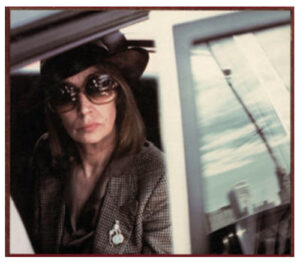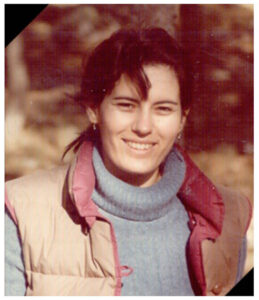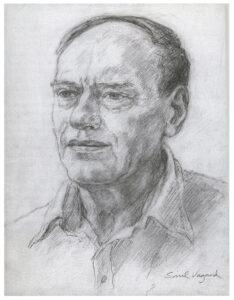“…in the inanimate democracies,
in the inert democratic regimes,
everything can be stated except the Truth.”
~~~~~~~~~~~~~~~~~~~~
“Whether it dresses in red or black or pink or green or white
or in all the colours of the rainbow,
the Left is confessional.
Ecclesiastic.
Because it derives from an ideology of religious character.
That it, because it appeals to an ideology which claims to possess the Truth.
On one side, the Good.
On the other, the Evil.
On one side, the Sun of the Future.
On the other, the Darkness.
On one side, the Comrades.
The blessed ones, the Faithful.
On the other the infidels or rather infidel-dogs.”
~~~~~~~~~~~~~~~~~~~~
“Because the Truth inspires fear.”
~~~~~~~~~~~~~~~~~~~~
“Making good men bad is perhaps more demonic than making men who are already bad worse.” – Alain Besancon
~~~~~~~~~~~~~~~~~~~~
Oriana Fallaci
– Photo by Alberto Toscani –
~~~~~~~~~~~~~~~~~~~~
Oh yes. It is a long-term ruler this Left that gave birth to Mussolini then Hitler,
and always maintained its bond with their disciples.
This Left which has always given trouble with its excesses and ambiguities,
its brutalities and duplicities.
All right: it has also given something good: I recognize it.
In Italy, for instance, it has helped to win vital battles
like the referendum for the Republic then for the divorce.
It has also understood in time that,
if the Communist Party continued to be a satellite of the Soviet Union,
the whole of Europe would have become a gulag.
Thus it had to accept NATO.
But its sins greatly outweigh its merits.
And its sins are so many that,
if Hell existed,
at the death all Communists and Company would plunge headlong into Lucifer’s throat.
One of those sins
(I already said this in The Rage and The Pride
but I shall never give up repeating what needs to be repeated)
concerns its intellectual terrorism.
Its presumption and assumption of holding the Truth.
Its dogmatism.
A dogmatism identical to the one of religions and churches.
“If-you-don’t-do-what-I-think, you-are-an-idiot-and-a-delinquent”
is the silent slogan that through
film-makers
and school-teachers
and university-professors
and intellectuals or pseudo-intellectuals
has poisoned two generations and now poisons the third.
(Let’s be straight.
The Red Brigades didn’t come out of Cavour’s brain:
they came out of the belly of the Left.
The no-globals and the mendacious pacifists
who disseminate the most obtuse illiberalism and the most bullying fascism
were not spawned by the Holy Spirit:
they were spawned by the Left.
And this truth is valid for America too.
Doesn’t American anti-Americanism originate from its Left?)
____________________
The Left speaks of progress.
For a century is has been singing hymns to Progress,
to Improvement,
to the Sun of the Future.
Thus, how can it possibly be fornicating with the most backward and reactionary ideology on Earth?!
The Left was born and grew in the West.
It is western.
It belongs to the most evolved civilization in history.
Thus, how can it possibly identify with a world
in which you have to be told that marrying your mother is wrong
and eating the sheep you keep as a mistress is a sin?!
How can it possibly sing the praises of a world
in which a girl can be widowed or repudiated at the age of nine or before?!
Then my sort of malady became an obsession, and I started asking:
“Do you understand, can you understand, why the Left is on the side of Islam?”
Well… Some answered: “Because the Left is pro Third World, anti-American, anti-Zionist.
Islam is also so.
In Islam the Left sees what the Red Brigades call their natural “ally”.
Others answered: “Because with the collapse of the Soviet Union
and the rise of capitalism in its former States and in China,
the Left has lost the old points of reference.
Ergo it clings to Islam as to a lifeboat.”
Or: “It’s obvious.
In Europe the real proletariat no longer exists,
and a Left without a proletariat is like a shopkeeper with no goods.
So in the Islamic proletariat the Left has found the merchandise it needs for selling:
a future reservoir of votes.”
But, although all the answers contained an indisputable truth,
none of them took account of the reasoning my question was based upon.
I continued to torment myself,
and this lasted until I realized that my question was wrong.
____________________
“…the Left is confessional.
Ecclesiastic.
Because it derives from an ideology of religious character.
That it, because it appeals to an ideology which claims to possess the Truth.
On one side, the Good.
On the other, the Evil.
On one side, the Sun of the Future.
On the other, the Darkness.
On one side, the Comrades.
The blessed ones, the Faithful.
On the other the infidels or rather infidel-dogs.
The Left is a Church.”
It was wrong because it came from a residue of respect for the Left
I had known as a child.
The Left of my grandparents, of my parents,
of my dead comrades, of my youth’s utopias.
The Left that ceased to exist half a century ago.
It was wrong also because it came from the political solitude in which I have always lived.
A political solitude which at that time
included the one given to me by moral and intellectual desert
of the phony heroes in whom I had believed as a youngster.
Justice and freedom.
Liberal-socialism.
And so on.
But above all it was wrong
because the reasonings or rather the premises
on which I had based my interrogative were wrong.
First premise, my illusion that the Left would be laic.
I mean secular.
Though the daughter of secularism,
(besides a secularism begotten by liberalism
and consequently not consonant with dogmatism),
the Left is not laic.
Whether it dresses in red or black or pink or green or white
or in all the colours of the rainbow,
the Left is confessional.
Ecclesiastic.
Because it derives from an ideology of religious character.
That it, because it appeals to an ideology which claims to possess the Truth.
On one side, the Good.
On the other, the Evil.
On one side, the Sun of the Future.
On the other, the Darkness.
On one side, the Comrades.
The blessed ones, the Faithful.
On the other the infidels or rather infidel-dogs.
The Left is a Church.
And not a Church similar to the Church which came out of Christianity,
thus open to free-will.
A Church similar to Islam.
Like Islam it considers itself sanctified by a God who is the custodian of the Truth.
Like Islam it never acknowledges its faults and its errors,
it considers itself infallible and never apologizes.
Like Islam it demands a world in its own image,
a society built on the verses of the Prophet.
Like Islam it enslaves followers.
____________________
“Everything can be spread except the thinking which reveals the Truth.
Because the Truth inspires fear.
Because in reading or hearing the Truth
most people surrender to fear and out of fear they draw a no-trespassing line around it.”
…in the inanimate democracies,
in the inert democratic regimes,
everything can be stated except the Truth.
Everything can be spread except the thinking which reveals the Truth.
Because the Truth inspires fear.
Because in reading or hearing the Truth
most people surrender to fear and out of fear they draw a no-trespassing line around it.
They built an invisible but insurmountable barrier
inside which one can only keep silent or join the chorus.
If the dissident crosses that line,
if he or she jumps over the Niagara Falls or that barrier,
punishment descends on him or on her at the speed of light.
And those who make it possible are precisely the people
who secretly think as he or she does
but out of convenience or cowardice don’t raise their voices
against the anathemas and the persecutions.
The friends, very often.
Or the so-called friends.
The partners.
Or the so-called partners.
The colleagues.
Or the so-called colleagues.
In fact, for a while, they beat behind the bush.
They trifle; they keep a foot in both camps.
But soon they become silent and,
terrified by the risks that such ambiguity exposes to, they sneak away.
The abandon the outlaw to his or her fate,
and with their silence they give their approval to his or her Civil Death.
(Something that I have experienced all over my life but especially in these last years.
“I can support you no longer” said to me, two or three Christmases ago,
a famous Italian journalist who had written two editorials in my defense.
“Why?” I sadly asked.
“Because people don’t talk to me anymore;
don’t invite me at dinner anymore,” he replied.
From…
The Force of Reason, by Oriana Fallaci, Rizzoli International Publications Inc., New York, N.Y., 2006
Alain Besancon Quote from…
A Century of Horrors: Communism, Nazism, and the Uniqueness of the Shoah, ISI Books, Wilmington, De., 2007



